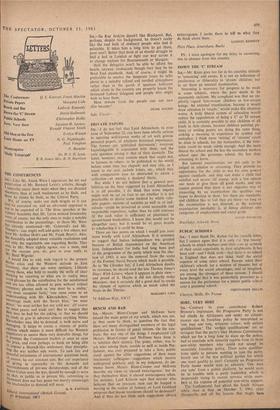PRIVATE PAPERS SIR,—I do not feel that Lord Altrincham, in
your issue of September 22, can have been wholly serious in equating well-known works of art with private personal papers, of whatever historical importance. The former are 'published documents'; everyone knowledgeable is acquainted with them; and the only question arising is that of their domicile. The latter, however, may contain much that ought not, in fairness to others, to be published to the world before some time has elapsed; and may also, as I know to my cost, include letters, etc., which may with comparative ease be abstracted to adorn a collection—or merely a doctoral thesis.
But while I do not believe that a general pro- hibition on the lines suggested by Lord Altrincham is at all possible, I do think that some inquiry might well be set on foot to see whether it is not practicable to devise some method by which valu- able papers—records of societies as well as of indi- viduals—could be preserved in some accessible and responsible repository, rather than be sold overseas (if the cash value is sufficient) or piecemeal to second-hand booksellers. I know this would not be altogether easy; but it would be of great benefit to scholarship if it could be done.
There are two points on which I would join issue more briefly with Lord Altrincham. It is nonsense to suggest that Indian independence was granted because of British dependence on the American loan. Independence for India had long been part of the programme of the party which won the elec- tion of 1945; it was the removal from the scene of the Former Naval Person which made it possible. As to 'the Cliveden Set,' if Lord Altrincham doubts its existence, he should read the late Thomas Jones's Diary With Letters, where it appears in plain view— and proud of it. Maybe it did not directly make Ministers—but it certainly did a great deal to create the climate of opinion which so much aided the Nazis in the Thirties.






































 Previous page
Previous page